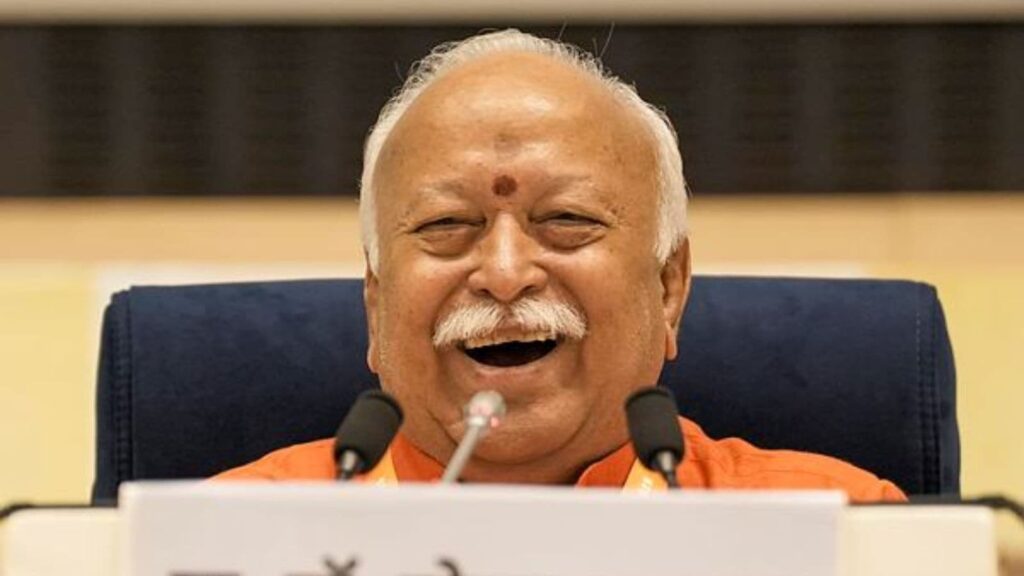RSS chief Mohan Bhagwat on Thursday indicated support for restricting meat sales during Hindu festivals out of respect for people’s sentiments, even as he underlined that people’s food habits should not be anybody’s business.
“Food is not linked to religion. But on the day of a fast, people do not eat. During festivals, eating vegetarian food is the norm. In those times, if one sees people doing this (eating or selling meat) right in front of their houses, it is possible their feelings will be hurt. It (the festival) is only a matter of two-three days. Using common sense, one should stay away from such things. What anyone eats should not hurt my sentiments. But it is good to have the sensitivity that it is their festival and they do not eat (meat), so I would not do it. When this common sense is not applied, then the law comes in,” Bhagwat said.
The RSS chief was fielding questions from attendees on the third day of the Sangh lecture series titled ‘100 Years of the Sangh’s Journey — New Horizons’ in New Delhi.
In articulating this position, Bhagwat reinforced what the Sangh has believed historically — that sentiments must be respected without the agenda of promoting vegetarianism.
Is there an ideological foundation for this position?
Over the last 10 years, BJP governments in various states have regulated the sale of meat. While Uttar Pradesh has seen meat shops being shut in certain regions for the whole duration of festivals such as Navratri and Kanwar Yatra, Madhya Pradesh had in the past tried to eliminate eggs from mid-day meals for students. MP CM Mohan Yadav, after taking over in 2023, announced meat sale regulation as one of his first decisions.
These articulations often centre around the idea that vegetarianism is a “purer” form of a diet, while also othering largely the Muslim community that is engaged in meat trade.
Historically, however, neither the BJP, nor its ideological fountainhead RSS, have had a problem with non-vegetarianism. It is largely beef eating that they are opposed to.
Story continues below this ad
RSS chroniclers such as Ratan Sharda say that a large number of Sangh workers are actually non-vegetarian. “The Sangh has never promoted vegetarianism. You may have seen totally vegetarian food at Sangh functions, but it has more to do with economics. The Sangh was never flush with funds, so relied on cheap vegetarian food for its functions. It slowly became a culture. But a large number of Sangh leaders are non-vegetarian,” Sharda, a lifelong RSS member, told The Indian Express in an earlier interview.
Sharda pointed out that the Sangh’s stand on cow meat was also clear — that it should not be eaten owing to the animal’s central role in Hinduism.
Have there been any adjustments to this position?
Yes, especially in areas in the Northeast where beef is commonly consumed.
“The Sangh has made adjustments in the Northeast and certain other places. Sangh pracharaks who work in the Northeast eat what the local people eat. In 1969, there was an RSS meeting in Assam and many local leaders who joined were beef eaters. There were murmurs within the organisation that these people cannot be called Hindus. Guru Golwalkar said they were all Hindus and may have resorted to eating beef because of economic reasons. He said they would come around with time. The Sangh has had no argument with society over dietary habits,” Sharda said.
Story continues below this ad
A senior RSS leader explained that barring cow meat, creating a nationwide cultural narrative over diet is considered counterproductive for the organisation’s expansion and the larger project of Hindu unity. “People of all hues come to the Sangh. In the coastal belt and states such as Kerala, almost everyone is a non-vegetarian. The Sangh keeps its dietary preferences in tune with the region it operates in. We never say one food is superior to the other. Within the Sangh there is never a debate on diet,” he said.
So, when did the shift towards vegetarianism happen?
Former RSS leader K N Govindacharya said the Sangh has historically had a problem with meat being sold in pilgrimage towns and around religious sites. “That is how Haridwar became vegetarian. There have been similar arguments for Mathura and Vrindavan. It was the responsibility of the government to ensure this, but there were lapses. But there is no blanket ban on meat eating for the Sangh,” he said.
A senior BJP leader said the push towards vegetarianism in the large political narrative of the party is a recent phenomenon. The leader narrated an anecdote from a 1954 Jana Sangh meeting held in Kolkata following the death of its founder Syama Prasad Mookerjee. Some 25-odd leaders were hosted by a local Jana Sangh functionary, who wanted to serve non-vegetarian food for dinner in accordance with Bengali traditions, but was unsure of the dietary preference of the leaders.
Since asking this question publicly was considered impolite, chits were passed around for people to mark their dietary preference. “Only two turned out to be vegetarians,” the leader said.
Story continues below this ad
An RSS functionary said a law on meat ban was only needed when communities could not sort out differences among themselves.
“What the sarsanghchalak (Bhagwat) said on Thursday is a message to all communities to sort these matters out amicably between themselves. Only if these are not sorted out, does the law come into the picture. It is true that most Hindus in certain parts of the country do not eat meat during key festivals. There is no harm in respecting their sentiments. Meat shops on parts of the Kanwar route are not being shut. For that period, the shopkeepers can make alternative arrangements. But, Bhagwat ji has also made it clear that no one should detest what others eat. It is a message to all communities,” an RSS functionary said.

